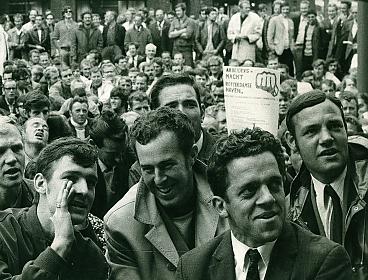A brief history of the SP

The Socialist Party, founded in October 1972, seemingly began life as no more than one of many left-wing factions on the fringes of society. However, having abandoned its flirtation with Maoism, the fledgling SP soon emerged as a party focused on the practical struggles of workers, tenants and victims of social injustice. All these activities lent the party a strong local presence, especially in the Catholic south of the Netherlands. Nevertheless, its national profile remained low.
Fifteen years after the SP was founded, the political landscape changed dramatically. The influence of the radical left had waned, both within and outside the Labour Party. By 1988, the two far-left parliamentary parties, the communist CPN and the Pacifist Socialist Party, had lost support and were no longer represented in the directly-elected lower house of parliament (the House of Representatives).
In 1987 and 1991, national SP congresses introduced important changes which laid the groundwork for the SP to fulfil this role. A federal structure was replaced by a national organisation committed to developing a nationwide profile, and the party was opened to everyone who could subscribe to its basic principles of human dignity, equality and solidarity equality.
Breaking through to parliament became the strategic priority of the SP. However, the party never abandoned its work in neighbourhoods and factories nor its broad-based approach to working for social progress for the sake of an exclusive focus on electoral politics. As the influence of neoliberalism grew, the SP steeled its efforts to combat its detrimental repercussions, i.e.: a society divided by wealth and poverty, the dismantling of the public sector, the social security system, health care and education, along with the withdrawal of the state from its social responsibilities.
In 1994, under the slogan ‘Vote against, vote SP’, and with its new but now instantly recognizable symbol, the tomato, the SP succeeded in getting two members into the 150-seat Parliament. Within four years, the party had 25,000 members, making it the country's fourth largest political party. The 1998 elections yielded five parliamentary seats. The same year brought the first participation in coalition governments on municipal councils, and the first seat in in the European Parliament came in 1999.
In 1999, the SP Congress adopted a modern form of socialism for the new century, outlined in ‘The Whole of Humanity’ charter. This contains the core of the SP’s vision of society and the alternatives that we propose. Our positions and activities are predicated on the concepts of human dignity, equality and solidarity. It is these values that over the course of many centuries have emerged as essential and indispensable aspects of human civilisation and social progress.
In 2005, the party took the lead in the campaign against the neoliberal European Constitution. Nearly two-thirds of Dutch voters said ‘No’ – despite the fact that all major parties were in favour of the proposed constitution – and this success was transformed into huge electoral victories for the SP in local, regional and national elections. In the national Parliament, the party in November 2006 won 25 out of 150 seats.
These successful elections unfortunately did not lead to a position in that coalition government. In 2008, the SP suffered a blow when long-standing and very popular leader Jan Marijnissen was forced due to ill health to give up his leadership of the party. He was replaced by Agnes Kant, the party’s spokesperson on health and social affairs. In 2010, Emile Roemer was elected as a new leader; in 2017 he was succeeded by Lilian Marijnissen.
In a fragmented political landscape, with many new political parties, and a domination of neoliberal politics, the party fell back to nine seats in 2021 – however it did become the largest left-wing party in the Dutch Parliament. The two sides of the SP’s work – within and outside of elected representative bodies – are never treated as separate or seen as in conflict with each other. Elected representatives at local, regional and national level remain committed activists.
Whether they are in government or in the opposition on a local or national level, the SP is committed to everyday contact with the woman and man on the street. At the heart of the SP's approach is what is known in Dutch as the 'actie-fractie’ (the action fraction): action is action; fraction the fraction in a parliament. This expresses the determination to link governmental and parliamentary work with the organisation and emancipation of people at their workplaces, in their neighbourhoods - both locally and everywhere around the world.
